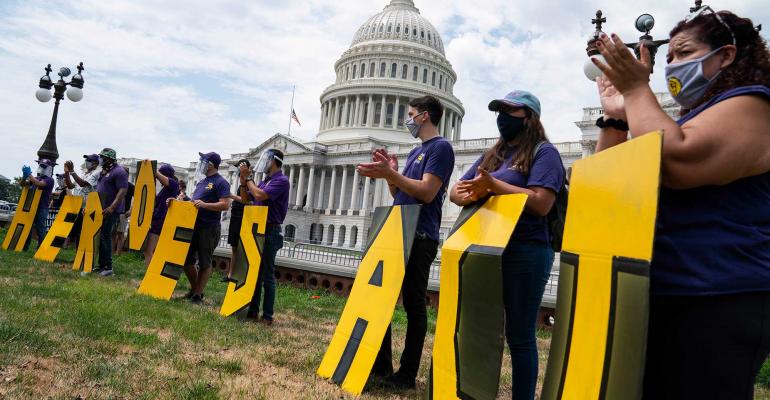While the CARES Act has helped multiple sectors of commercial real estate achieve relative stability in rental income over the past few months, those rental flows are now in jeopardy without the passage of the federal rescue package.
Up until now, the U.S. Senate has failed to resolve a dispute over how much money to spend to mitigate COVID-19’s impact on the country’s economy. As of Wednesday morning, House Speaker Nancy Pelosi and Treasury Secretary Stephen Mnuchin, who have been leading the negotiations, remained more than $1 trillion apart on the final price tag on the package, which would include an extension on expanded unemployment benefits for out-of-work Americans, more aid for small businesses and potentially aid for cities and states.
NREI connected with Spencer Levy, chairman of Americas research and senior economic advisor at real estate services firm CBRE, Dave Bragg, managing director of strategic research at Green Street Advisors, and Shlomi Ronen, principal and founder of real estate merchant bank Dekel Capital, to discuss their reactions to the stalled rescue package and what it means for the commercial real estate industry.
This Q&A has been edited for style, length and clarity.
NREI: What has been the impact on the lapsed benefits from the CARES Act on the commercial real estate industry?
Spencer Levy: The CARES Act has been a big benefit to the commercial real estate industry by “raising the bottom” of rent collections in all asset classes. We are now seeing improvement even in retail, the hardest hit area of commercial real estate, albeit at a slower pace than anyone would like. The Paycheck Protection Program (PPP) enabled many small businesses to pay rent when they otherwise could not, and enhanced unemployment insurance benefits helped people meet their rent obligations in multifamily. In short, we know that CARES Act funding was vital in maintaining market stability, but we haven’t yet seen any major impacts from the failure to enact additional fiscal stimulus. Still, as more time goes on, without additional aid, risks to the relative stability experienced thus far will increase.
Dave Bragg: It is too early to see the impact clearly, but it is fair to assume that there is downside risk potential for apartment and single-family rents, as well as a potential weakening of retail spending, which impacts malls, strip centers and self-storage.
Shlomi Ronen: Too early to tell how this will impact the real estate industry. The [CARES] Act was instrumental in helping multifamily tenants and small businesses sustain rent payments during the lockdown. As states loosen their COVID-19 restrictions and businesses start to ramp up operations, the lack of government support may be less of an issue for most commercial real estate landlords.
NREI: Which parts of the legislation included in the HEROES Act are of the most urgency for the commercial real estate industry?
Spencer Levy: The HEREOS Act, which is the $3 trillion legislation passed by the House but not the Senate, is unlikely to become law as it requires significant additional negotiation between the House and the Senate (which has proposed a $1 trilling package) to resolve. At the same time, all federal stimulus would benefit commercial real estate both directly (through additional small business aid and enhanced unemployment insurance) and indirectly (through subsidies for state and local governments, which, in the absence of additional aid, may have to raise local property taxes).
Dave Bragg: The enhanced unemployment benefits, as discussed above, are probably most important. Next is likely fiscal aid to states and cities.
Shlomi Ronen: The rental assistance provision in the HEROES Act is the most urgent in my opinion, especially for those tenants/residents that work in the restaurant and entertainment industries that seem to be the hardest hit by the pandemic.
NREI: How important is the legislation concerning help for CMBS borrowers that is included in the HOPE Act of 2020 proposal for the stability and recovery of the commercial real estate industry?
Spencer Levy: The HOPE Act, which would provide preferred equity to the borrowers of CMBS loans, would be a significant boost to CMBS borrowers, in particular those in the retail and hospitality industries. The challenge with CMBS loans is that the borrowers have limited ability to negotiate a workout or forbearance arrangement. The HOPE Act was designed to work within the existing loan structures to provide additional capital to borrowers to bridge the gap through the end of the COVID-19 period.
Shlomi Ronen: It impacts the commercial real estate industry two-fold: helps owners of commercial real estate that have been hard hit by the pandemic by allowing them to access capital to ride out the downturn and investors in the CMBS bonds from incurring losses that could take them out of the market, negatively impacting the buyer pool of new CMBS issuances.





